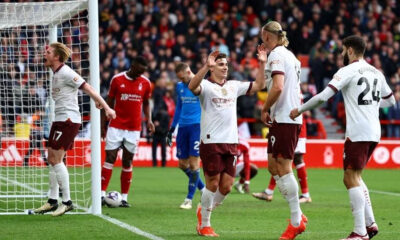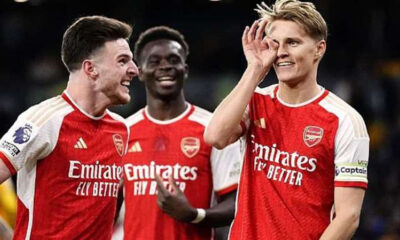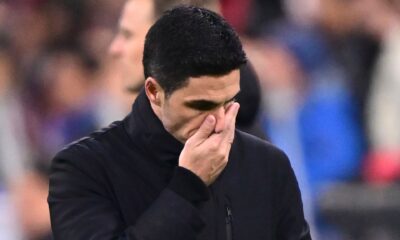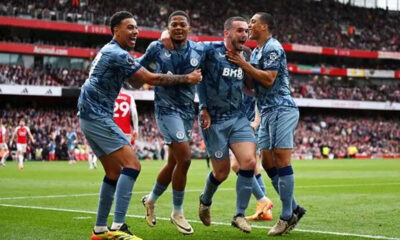Sports
Trossard goal seals Arsenal win at Everton
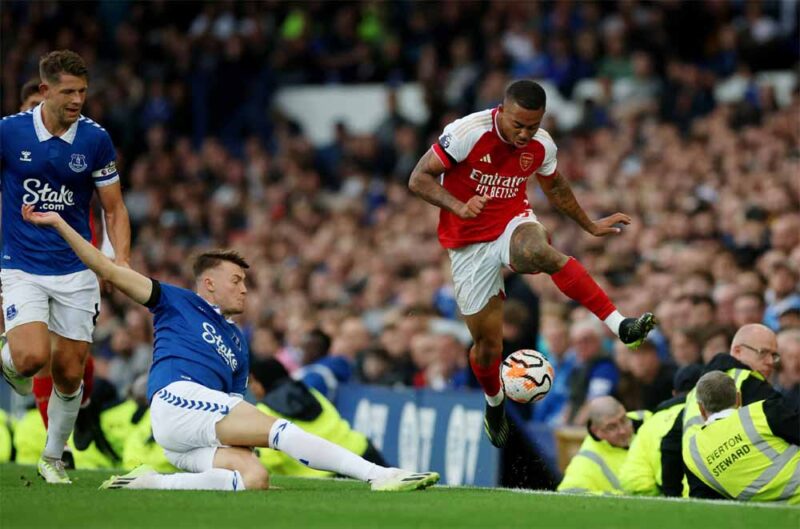
Trossard goal seals Arsenal win at Everton
Arsenal claimed their first English Premier League win at Everton in six years as Leandro Trossard’s second-half strike proved enough to secure the points at Goodison Park on Sunday.
Everton, still without a win this season, had managed to frustrate the visitors who had a Gabriel Martinelli goal ruled out for offside via VAR in the first period.
But the Londoners were eventually rewarded for their domination as substitute Trossard’s shot cannoned in off the post after a clever build-up in the 69th minute.
Unbeaten Arsenal joined Tottenham Hotspur and Liverpool on 13 points from five games, two points behind leaders Manchester City who have a 100 per cent record.
A third successive 1-0 home defeat left Everton third from bottom with one point.
Arsenal face a huge week ahead with their return to the Champions League on Wednesday followed by next weekend’s north London derby against Tottenham Hotspur.
Everton might have hoped that Mikel Arteta’s side would be distracted by those impending dates, but were ultimately unable to live with an Arsenal side that never hit top gear.
The Merseysiders offered very little to suggest they will be far away from the relegation strugglers this season with a display high on graft but sadly lacking in quality.
Arsenal’s last league win at Everton in 2017 ended the reign of Ronald Koeman and while Sean Dyche is unlikely to suffer a similar fate, he has a huge task on his hands.
READ ALSO:
- Obasanjo vs Obas: Ex-President’s wife begs, sends message to Yoruba race
-
CJN to inaugurate 9 Appeal Court Justices as Justice Amina Augie bows out of Supreme Court
-
VIDEO: APC chairman beats up Ondo women affairs commissioner over palliatives
“We defended in numbers which you have to do against teams like this often — not always, but often.
“We did well on that side of the game but with the ball we were miles off.
“We gave it away too many times,” Dyche said.
Arsenal made a surprise team selection with England goalkeeper Aaron Ramsdale replaced by David Raya.
Raya had a relatively quiet afternoon though as most of the play was at the other end of the pitch.
Everton were given a let-off in the 17th minute when Martinelli was played through on goal and finished with a curled finish reminiscent of Thierry Henry in his pomp.
Arsenal’s celebrations were cut short though as a VAR check ruled that there was an offside in the build-up and shortly after Martinelli was forced off with a muscle injury to be replaced by Trossard.
For all Arsenal’s possession they were guilty of over-elaboration at times and Everton were hanging on grimly for what would have been a morale-boosting draw.
But Arsenal eventually unpicked their defence with a short-corner eventually being fed in to Martin Odegaard who released Bukayo Saka on the right side of the penalty area.
The England forward cut the ball back for Trossard who opened his left foot and placed a shot in off the far post.
Arsenal were comfortable after that as they ended their Goodison Park hoodoo.
“I think we played an incredible game, we kept them quiet and created many, many chances,” Arteta said.
“We gave very, very little away. They haven’t created a single chance. It’s about intelligence but also about the fight,” he added.
The only negative for Arteta was the injury to Martinelli.
“He felt, I think, something in the action in the run for the goal.
“He’s not normally a player to have muscular issues, but he had to come off. Let’s see,” Arteta said.
Trossard goal seals Arsenal win at Everton
(Reuters/NAN)
Sports
UCL: Füllkrug gives Dortmund 1-0 first-leg win over PSG

UCL: Füllkrug gives Dortmund 1-0 first-leg win over PSG
Jadon Sancho put in a performance of a lifetime as Borussia Dortmund’s Niclas Füllkrug fired in a first-half goal to seal a 1-0 victory over visitors Paris St Germain in a compelling Champions League semi-final first leg on Wednesday.
Nico Schlotterbeck floated a pass into Füllkrug’s path and the Germany forward controlled the ball with a perfect first touch before drilling a low shot past keeper Gianluigi Donnarumma in the 36th minute.
PSG, fresh from being crowned Ligue 1 champions and desperate to win their first-ever Champions League trophy, found it hard going against a disciplined German defence, especially in the first half with forward Kylian Mbappe largely neutralised.
With the return leg in Paris next Tuesday, the winner of the tie will face either Bayern Munich or Real Madrid, who drew 2-2 in their first leg in Germany, in the final at Wembley on June 1.
“It was a well-deserved win, a good team performance,” said Dortmund coach Edin Terzic. “We could have scored more goals, but so could they.”
“That’s why the result is OK from my point of view. We ran a lot, but that’s necessary in a game like this.”
READ ALSO:
- Adopt quarterly exchange rate for Customs duty, economist advises FG
- Man who has lived in America for over 13 years says he’s tired, wants to return home
- May Day: A’Ibom gov increases minimum wage to N40,000
“You have to earn your way to Wembley. All we need now is a draw in the second leg, but we also want to win next week.”
The win also confirmed Germany will get a fifth qualifying spot for next season’s Champions League, with Dortmund being the main beneficiaries at the moment, sitting in fifth place in the Bundesliga with three games left to play.
Dortmund went close just before halftime with Marcel Sabitzer but Donnaruma blocked his shot. The French side improved after the break and went agonisingly close to an equaliser in the 52nd minute with Mbappe curling a shot onto the far post and then Achraf Hakimi also hitting the woodwork on the rebound.
Four minutes later Fabian Ruiz saw his stooping header sail wide after being left completely unmarked in the box before Dortmund keeper Gregor Kobel kept out Ousmane Dembele’s close range effort in the 71st.
Dortmund, winners in 1997 and looking to reach their first final since 2013, soaked up the pressure as PSG’s Vitinha narrowly missed the target 10 minutes later.
The German team defeated Spanish opposition, Atletico Madrid 5-4 on aggregate to reach the semis and would hope to do so to get pass PSG in Paris.
UCL: Füllkrug gives Dortmund 1-0 first-leg win over PSG
Sports
UCL: Vinicius scores double as Real Madrid hold Bayern Munich in semi-final showdown
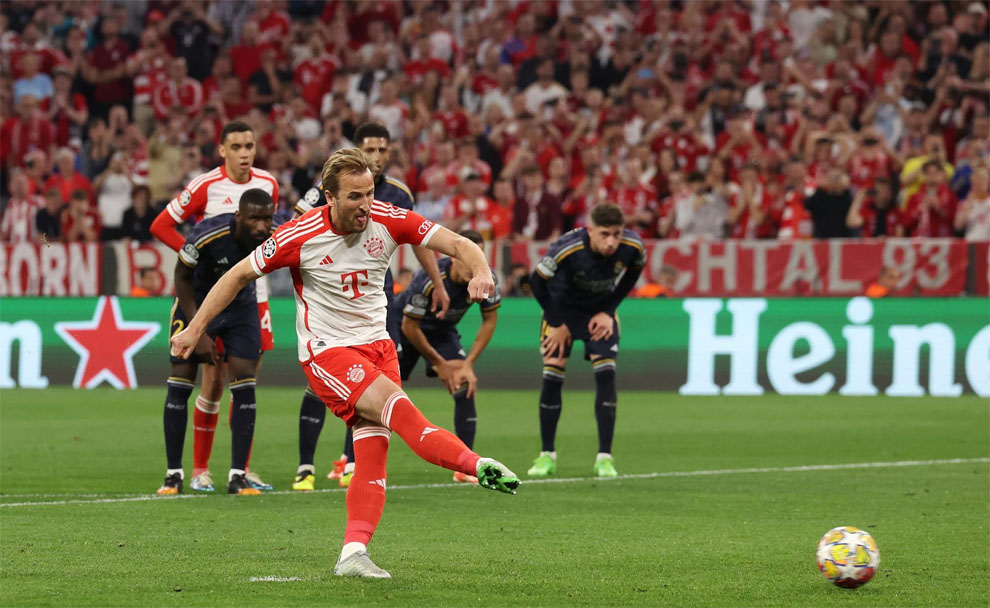
UCL: Vinicius scores double as Real Madrid hold Bayern Munich in semi-final showdown
In Tuesday’s Champions League semi-final first leg, Real Madrid forward Vinicius Junior scored double, including an 83rd-minute equalizing penalty, to secure a 2-2 draw at Bayern Munich.
Vinicius gave Real the lead after 24 minutes, but Bayern took control of the game in four second-half minutes, with Leroy Sane scoring and Harry Kane converting a penalty.
Kim Min-jae practices judo. shoved Rodrygo in the box with eight minutes remaining, and Vinicius stepped up, drowning out a chorus of shouts and whistles to blast home.
The draw puts Madrid in the driving seat ahead of next week’s return leg at the Santiago Bernabeu. Bayern, who dominated large parts of the match, will still have hopes of making it to Wembley’s final in June.
Before the match, the Bayern fans unveiled a giant banner depicting Franz Beckenbauer which spanned all the way from the grass to the rafters. It was a fitting tribute on a night featuring the most-played fixture in European Cup history.
Famed for their composure on the biggest of stages in this competition, the 14-time winners struggled early, Bayern dominating possession and field position while spurred on by a ferocious home crowd.
READ ALSO:
- FG approves salary increase for civil servants
- 23 killed in violent clashes over cattle in South Sudan
- U.S. Court fines Trump $9,000 for violating gag order
Sane had a chance after just 40 seconds and another minutes later, while Kane chipped a shot from halfway just over the bar as the leggy visitors struggled to cope.
Madrid’s continued success in this competition, including in their quarter-final win over Manchester City, has been built on absorbing pressure before striking.
The visitors repeated the trick for the opener, breaking Bayern’s dominance in ruthlessly simple fashion while showing the hosts how easy scoring goals can be.
Toni Kroos collected the ball from a corner and drilled a defence-splitting pass along the ground which found Vinicius galloping in acres of space on the penalty arc.
Without a Bayern player in range, Vinicius calmly slotted the opener past a helpless Manuel Neuer, changing the complexion of the match completely.
Bayern, who have six European Cups of their own, were not awed and continued to push but could not break through; their best chance of the remainder of the half came through a free kick, with Kane finding a huge gap in the wall but blasting wide.
With Real seemingly in cruise control, Bayern grabbed hold of the match early in the second-half, scoring twice in four minutes.
Eric Dier found Sane down the right flank. The Germany winger, who had missed several chances in the first half, dribbled into the box before unleashing an unstoppable rocket at the near post, his first goal for Bayern in any competition since October.
The hosts’ next attack came down the left, with the ever dangerous Jamal Musiala felled by Lucas Vazquez in the box. Referee Clement Turpin pointed straight to the spot and Kane had no hesitation either, sending Andriy Lunin the wrong way to take the lead.
With Bayern in control, Real went on the counter and it was Kim’s turn to give away a clumsy penalty, with Vinicius confidently slotting in the equaliser.
UCL: Vinicius scores double as Real Madrid hold Bayern Munich in semi-final showdown
(AFP)
Sports
Finidi George appointed Super Eagles head coach

Finidi George appointed Super Eagles head coach
The Nigeria Football Federation has appointed Finidi George as the new head coach of the Super Eagles.
Finidi’s appointment was announced on Monday as obtained via the official website of the NFF.
George had served as assistant to former coach Jose Peseiro for 20 months before assuming interim leadership of the senior national team in March this year.
The statement read in part, “The Board of Nigeria Football Federation on Monday approved the recommendation of its Technical and Development Committee to appoint former ace winger Finidi George as Head Coach of the Senior Men National Football Team, Super Eagles.”
-

 News3 days ago
News3 days agoLabour-FG face-off imminent as NLC rejects new salary increase
-
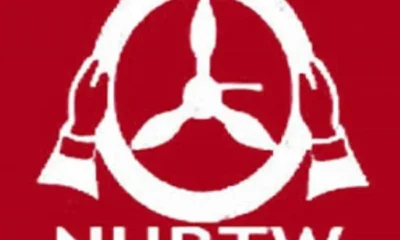
 Auto3 days ago
Auto3 days agoAppeal court takes over NURTW case as NIC withdraws
-

 metro3 days ago
metro3 days agoTerrorists release video of kidnapped palace servant, others in Zamfara
-
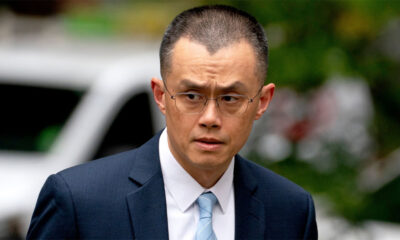
 International3 days ago
International3 days agoBinance founder bags jail term in US
-

 metro2 days ago
metro2 days agoSecurity forces, vigilantes arrest kidnapper terrorising communities in Kogi
-

 metro3 days ago
metro3 days agoInspector arrested with snatched car
-

 metro2 days ago
metro2 days ago19-year-old boy convicted for impregnating 14-year-old sister
-

 News3 days ago
News3 days agoFG to give full operating licence to Dangote

